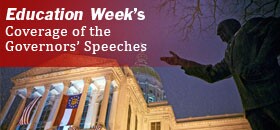For complete coverage of this year’s governors’ speeches, check out State of the States 2011.
FLORIDA
Gov. Rick Scott (R) • March 8
In his first State of the State address, Gov. Scott asked lawmakers to support his broad agenda of slashing government spending and making changes to how teachers are evaluated and paid.
During his campaign last year, the governor promised to cut taxes and create 700,000 jobs in Florida, which has struggled to emerge from the recession. In his speech, Gov. Scott voiced support for proposals to require teachers and other public employees to pay more for their pensions and to phase out tenure protections for educators. Both of those ideas appear to have strong support from the GOP-controlled legislature.
Last month, Mr. Scott proposed a $66 billion budget for fiscal 2012 that would cut overall school funding by 10 percent, to $16.4 billion, in a spending plan that includes a $700 reduction in per-student aid, while cutting taxes on corporations and property owners.
—Sean Cavanagh
ILLINOIS
Gov. Pat Quinn (D) • Feb. 16
With Illinois facing a major budget shortfall, Gov. Pat Quinn proposed deep cuts in school transportation funding and suggested that districts could consolidate as a way to save the state money.
In his annual budget address to state lawmakers, Gov. Quinn said he wanted to create a commission that would make recommendations on consolidating some of the state’s 868 school districts. He predicts that merging school systems could save taxpayers $100 million by reducing administrative costs and other savings. “Our fiscal reality demands consolidation,” he told members of the legislature, which is controlled by Democrats.
Illinois, which has a total general fund budget of $26 billion, faces an estimated deficit of $13 billion. Mr. Quinn proposes closing some of that gap by having the state restructure its debt. He has called for raising K-12 general fund spending from about $7 billion in fiscal 2011 to $7.3 billion in fiscal 2012, though spending in certain areas, like school transportation, would be reduced. —Sean Cavanagh
OHIO
Gov. John Kasich (R) • March 8

Education is feeling the pinch as state budgets tighten nationwide. Read what the governors plan for education funding and reform in 2011 in our State of the State and budget address roundups. Read more.
In his first State of the State address, Gov. Kasich promised to promote school choice and to back the growth in Ohio of Teach for America, a New York-based nonprofit that seeks to bring talented undergraduates into teaching. But he barely touched on a controversial measure he supports that would curb collective bargaining rights for teachers and other public workers.
Mr. Kasich, a former congressman elected governor last November, was heckled by at least one visitor to the House chamber when he referred to the GOP-supported legislation on collective bargaining. The proposal would limit teachers’ ability to bargain on issues other than wages and certain work conditions, while also mandating performance pay for educators, among other steps.
Gov. Kasich argues that the proposal will save money for state and local school districts. The governor, whose state faces an $8 billion, two-year projected budget shortfall, also said he will support efforts to encourage school districts and local governments to share services. —Sean Cavanagh
PENNSYLVANIA
Gov. Tom Corbett (R) • March 8
Facing a $4 billion budget deficit for fiscal 2012, Pennsylvania has reached a “day of reckoning,” and education will bear a large portion of the pain, Gov. Corbett told a joint session of the legislature in his first budget address.
Chosen last November in an election that also put Republicans in control of both chambers of the state legislature, the Republican governor sought to fulfill his campaign promise to cut spending without raising taxes.
He called for a one-year pay freeze for public school employees, a move projected to save $400 million. He proposed that public employees contribute more than the current 3 percent of their salaries to health care benefits. He suggested that any property-tax increase exceeding inflation be put to a popular vote, and proposed that school boards be freed to curb spending by taking such actions as furloughing employees.
The governors proposed budget is $27.3 billion, down from $28 billion in the current fiscal year. It includes $8.6 billion for precollegiate education, compared with $9.9 billion currently. The biggest chunk of pre-K-12 funding, the basic education subsidy, would be cut from $5.7 billion to $5.2 billion. —Catherine Gewertz




